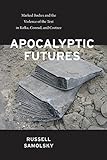Apocalyptic Futures : Marked Bodies and the Violence of the Text in Kafka, Conrad, and Coetzee / Russell Samolsky.
Material type: TextPublisher: New York, NY : Fordham University Press, [2011]Copyright date: ©2011Description: 1 online resource (252 p.)Content type:
TextPublisher: New York, NY : Fordham University Press, [2011]Copyright date: ©2011Description: 1 online resource (252 p.)Content type: - 9780823234806
- 9780823241514
- 809.304
- online - DeGruyter
| Item type | Current library | Call number | URL | Status | Notes | Barcode | |
|---|---|---|---|---|---|---|---|
 eBook
eBook
|
Biblioteca "Angelicum" Pont. Univ. S.Tommaso d'Aquino Nuvola online | online - DeGruyter (Browse shelf(Opens below)) | Online access | Not for loan (Accesso limitato) | Accesso per gli utenti autorizzati / Access for authorized users | (dgr)9780823241514 |
Frontmatter -- contents -- figures -- acknowledgments -- introduction. Writing Violence -- chapter one. Metaleptic Machines -- chapter two. Apocalyptic Futures -- chapter three. The Body in Ruins -- coda. The Time of Inscription -- notes -- index
restricted access online access with authorization star
http://purl.org/coar/access_right/c_16ec
In this book, the author argues that certain modern literary texts have apocalyptic futures. Rather than claim that great writers have clairvoyant powers, he examines the ways in which a text incorporates an apocalyptic event into its future reception. He is thus concerned with the way in which apocalyptic works solicit their future receptions.Apocalyptic Futures also sets out to articulate a new theory and textual practice of the relation between literary reception and embodiment. Deploying the double register of “marks” to show how a text both codes and targets mutilated bodies, the author focuses on how these bodies are incorporated into texts by Kafka, Conrad, Coetzee, and Spiegelman.Situating “In the Penal Colony” in relation to the Holocaust, Heart of Darkness to the Rwandan genocide, and Waiting for the Barbarians to the revelations of torture in apartheid South Africa and contemporary Iraq, the author argues for the ethical and political importance of reading these literary works’ “apocalyptic futures” in our own urgent and perilous situations. The book concludes with a reading of Spiegelman's Maus that offers a messianic counter-time to the law of apocalyptic incorporation.
Mode of access: Internet via World Wide Web.
In English.
Description based on online resource; title from PDF title page (publisher's Web site, viewed 03. Jan 2023)


